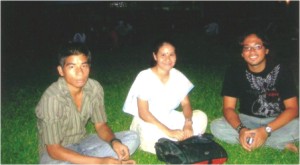|
Feature
An evening with three adibashi students of DU
Feeda Hasan Shahed
It has been a wonderful experience to sit for an adda with three outstanding adibashi Bangladeshis in an evening. Their delighted happy faces put up a continuous expression of joyful Dhaka University students. Priasi Tripura from Anthropology, Johny Maung Marma from IBA and Dilip Kumar Tripura from the Finance department were the three lovely personalities with whom I shared many issues in a friendly conversation. What I was pleasantly surprised was to find all three of them so communicative; none of them hesitated to express their original views.
 About their campus life, they were very excited to say that they had been enjoying a lot! There is so much fun that is going on. The freedom, the pride being a university student knows no bound. Johny mentioned, 'I enjoy my campus life very much. I have toured every single place in the university and know a lot of places that even my Bangalee friends don't know. I used to give adda-s with both tribal and non-tribal friends. I have lots of Bangalee friends as my school and college education are both from Dhaka the Ideal School and the Notre Dame College. So I hangout every day with my friends and often return home. I feel really wonderful.' About their campus life, they were very excited to say that they had been enjoying a lot! There is so much fun that is going on. The freedom, the pride being a university student knows no bound. Johny mentioned, 'I enjoy my campus life very much. I have toured every single place in the university and know a lot of places that even my Bangalee friends don't know. I used to give adda-s with both tribal and non-tribal friends. I have lots of Bangalee friends as my school and college education are both from Dhaka the Ideal School and the Notre Dame College. So I hangout every day with my friends and often return home. I feel really wonderful.'
'Mine is different. I enjoy a lot being a residential student. My studies, adda-s, co-curricular activities… all go on inside the campus,' says Priasi.
'Me too!' agrees Dilip, 'but I have to study hard as a BBA student.'
Johny said, 'I study the night before exam. Come on man! Life is short!'
I wanted to know if their expectations regarding the campus have been fulfilled or not. They said that a majority of their expectations has been fulfilled though not all. 'We thought that it would be wonderful friendly arena, but at the beginning, it wasn't,' they said. They mentioned of some negative views about them by the Bangalee students.
Mentioning the present condition of the Adibashis, all three mentioned that the infrastructure is not so strong. There aren't many teachers in the school and colleges. But the number of students is increasing for their enormous interest. Now more students are getting admitted in the universities. 'I think they need proper guidance to prepare themselves for the university level,' says Dilip. Priasi added that most of the students after finishing their college life don't know how to prepare themselves for the admission tests. They are not quite aware of the tough competition.
'In my view, the quota system should be called off, 'coz for this the students don't feel the urge to compete,' Johny said. 'Not at all!' protested the other two. Priasi added, 'See, this quota system is just a gate-pass to the university, but rest of the student life is never dependent on the quota. We have to work really hard for next four years! Besides I was only 10 mark short in admission test; doesn't that prove that I am capable enough?'
'And local students get an upper hand through coaching and model tests which we don't get in our area. So quota system should stay,' added Dilip.
As regards their academic lives, they mentioned that the departments have been more or less quite serious, and they haven't faced any kind of problems. Proper assistance by teachers made their academic life easy, as they felt.
I asked then, 'Achha, we know about the distinction between Bangalee and adibashi cultures. At the same time we know that cultural diversity enriches a nation. How have been the Bangalees and the adibashis playing their roles to sustain this diversity?'
'You see, there are lots of misconceptions about adibashi Bangladeshis. People in general think us different from them. Moreover, in primary school books adibashis are narrated as “short”, “black” and “living in jungles”. These things widen the gaps and keep us apart from the Bangalees,' Johny sadly explained. 'We are Bangladeshis, and are just like any other Bangladeshis. We speak Bangla though we have our own dialects… but isn't that the case with other districts too? But the misconceptions have played a vital role in demarcation.
We never say or feel that Bangalees don't accept us. In fact, they have showed much interest, but we didn't properly get the chance to introduce our culture. By building a strong communication between the communities it will be easier to enrich our national cultural diversity.'
In the end, all of them made a significant observation. An overall positive and responsive attitude towards the Adibashi people needs to be enhanced in all levelsbecause that's the only way to construct an everlasting bridge of understanding, sharing and caring between the Bangalees and Adibashis.
Copyright
(R) thedailystar.net 2006 |
